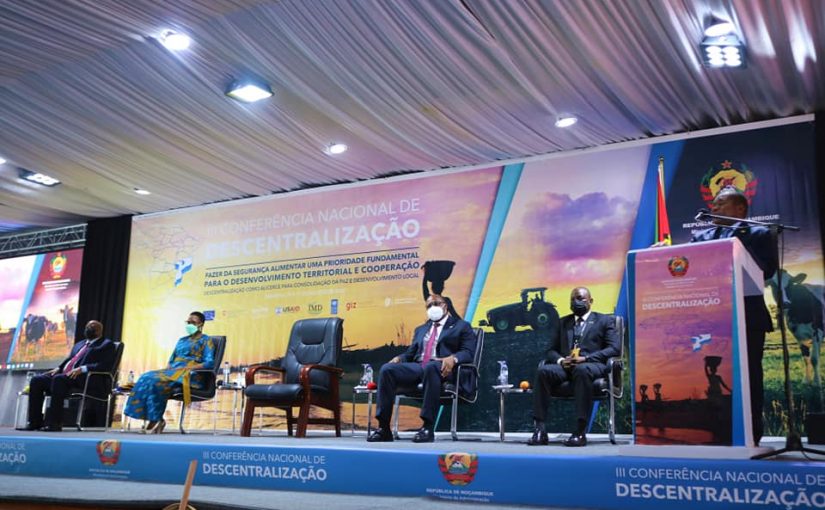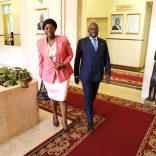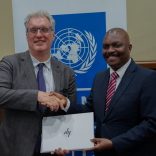Mozambique: Foreign Minister expresses desire to boost economic ties with Angola
Mozambique: Nyusi asks whether district elections are feasible in 2024 – AIM

Photo: Conselho Executivo de Nampula
Mozambican President Filipe Nyusi on Wednesday insisted that there must be further reflection on the viability of holding elections to district assemblies in 2024, as proposed in the decentralization package adopted in 2018.
Speaking in the northern city of Nampula, at the opening of a national conference on decentralization, Nyusi said participants should be free to discuss the pros and contras of holding the district elections.
He stressed that he is not giving any instructions. “I haven’t said ‘don’t hold them’, and I haven’t said ‘do hold them. I have said ‘look deeper into the matter’. Reflecting is thinking and everybody has the right to think”, said Nyusi. “It is not forbidden to think in order to take better decisions”.
READ: Mozambique: President reiterates call for “deep reflection” on feasibility of district elections
This is the second time Nyusi has suggested postponing the district elections, to predictable howls of outrage from the main opposition party, Renamo, which points out that the district elections are in the Mozambican Constitution. That is true – they were included in the Constitution as part of the price to pay for Renamo to lay down its weapons and disband its militia.
Last May, at the end of a meeting of the Central Committee of the ruling Frelimo Party in Maputo, Nyusi invited all political parties and civil society organisations to reflect on the feasibility and sustainability of pushing ahead with district elections in 2024.
There are currently 154 districts (and rather more, if urban districts are included). Nobody has yet calculated how much the district assemblies will cost.
READ: Overlaps aside, Renamo insists on “irreversible” election of district administrators
They will certainly complicate national elections. Voters will already be faced with three ballot papers in 2024, for the presidential, parliamentary and provincial assembly elections. Adding a fourth, for the district assemblies, would inevitably lengthen the time taken to count the votes and declare the results. Even discounting the possibility of deliberate fraud, tired polling station staff, working since 05.00 in the morning, are bound to make more mistakes, if the count is extended deeper into the night.
Just as with the municipalities and the provinces, the district assembly elections will be organized on a party list basis. The head of the list of whichever party wins will become the new district administrator. The administrator heads a district government, known as the District Executive Council, which answers to the District Assembly.
The Constitution says nothing else. The powers of the District Administrator and of the District Executive Council are to be fixed by laws which do not yet exist.
Even the size of the district assemblies are not yet known. But it seems certain that they will provide hundreds, if not thousands of new jobs, with wages and allowances adding to the pressures on the state budget
Those new jobs give significant powers of patronage to the political parties participating in the elections, and doubtless this is why Renamo is so insistent that the elections should go ahead.
Nyusi told the Nampula meeting that decentralization is an irreversible government commitment, although he recognized that it is an unfinished process
“The misunderstandings, overlaps and even involuntary frictions, should be taken as part of a new process and should not create nightmares for us”, the president said. There have now been two decades of decentralized governance, and so Nyusi believed that “decentralization is not imposed by itself, as it arises to meet the needs of local communities and there is no perfect model”.
He thought that credible decentralization “contributes to greater administrative efficiency, transparency, and citizen participation, and expands the possibilities for democracy, good governance, and local development”.
The constitutional amendments of 2018 on decentralization were “a historic milestone”, he claimed, but they did not constitute “a finished model”.
“Mozambicans should not be afraid to correct what could be better”, stressed Nyusi. “It is up to Mozambicans themselves to accept, believe, perfect and improve this model with a cool head, humility and serenity, always keeping in mind that decentralization is not finished.”
“Where there is decentralization there must be peace, harmony, so that we can develop”, he added. The last three years of governance in Mozambique, “are part of an embryonic journey of decentralization that has allowed lessons to be drawn and challenges to be identified for strategies that include innovations, drawing on national solutions to Mozambican problems and seeking inspiration from other places when necessary.”













Leave a Reply
Be the First to Comment!
You must be logged in to post a comment.
You must be logged in to post a comment.